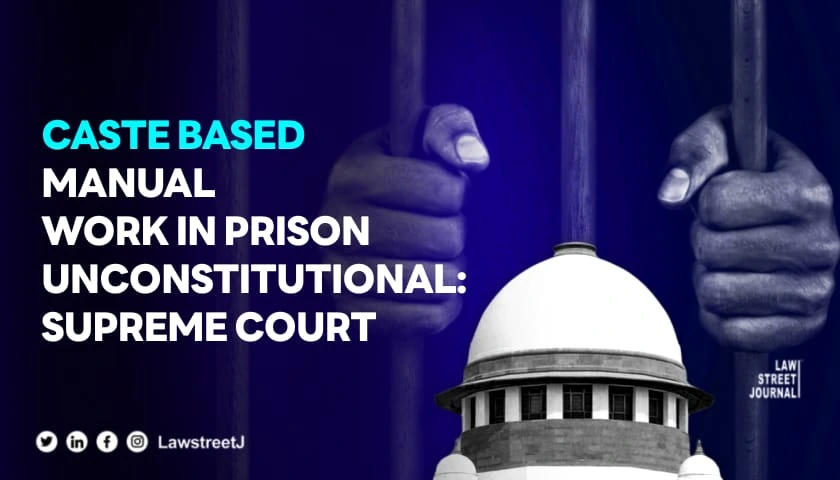NEW DELHI: In a significant judgment with far reaching repurcssions, the Supreme Court on Thursday held that there cannot be any caste-based discrimination in prisons across the country and all present provisions in jail manual perpetuating such discrimination would be unconstitutional.
"The Prison manual 2016 of the central government suffers from lacunae. The manual of 2016 should prohibit classification of prisoners on the basis of caste. Distribution of manual work among prisoners on the basis of their caste hierarchy is discriminatory and unconstitutional," a bench presided over by Chief Justice of India D Y Chandrachud said.
The bench, also comprising Justices J B Pardiwala and Manoj Misra pronounced its judgment on a plea, filed by Sukanya Shantha, a native of Kalyan in Maharashtra, alleging that prison manuals of some states in the country encouraged caste-based discrimination.
The court directed that the prisoners would not be permitted to cleaning of sewers tanks etc in hazardous conditions, as these practices are of colonial era and most of the laws were framed during British rule.
"The state shall be held liable if violation of Article 23 (Prohibition of traffic in human beings and forced labour) of the Constitution is being done by private individuals. The prisoners can't be made to do inhuman work and being treated inhumanely, hatred, contempt towards the caste based discrimination, and pervasive bias towards such castes," the bench said.
The court registered a suo motu case of the discrimination inside prisons and directed its registry to list 'In re: discrimination inside prisons' after three months.
It directed all the states to submit compliance report with this judgment before this Court.
Emphasising that the court has to ensure that marginalized people do not suffer, the bench said, this court have held that constitution recognizes SC/ST for protective discrimination but caste cannot be used to discriminate against the marginalised and that it should not perpetuate discrimination against oppressed.
"There cannot be such discrimination among prisoners and segregation among prisoners will not lead to rehabilitation," the bench said.
The court said assigning cleaning and sweeping to marginalised and assigning cooking to higher caste is nothing but violation of Article 15 of the Constitution.
"Such indirect uses of phrases which target so called lower castes cannot be used within our constitutional framework. Prison manuals are only reaffirming such discrimination," the bench said in the order.
The court noted that UP Manual provided that a person going under simple imprisonment will not work in degrading and menial work unless his caste is used to do such jobs.
"No group are born as scavenger class or to do or not do menial jobs. Classes who can cook and who cannot cook are aspects of untouchability which cannot be permitted," the court said.
The bench held the definition of habitual offenders is problematic under the legislation.
"Several prison manuals or rules notify habitual offenders as members of denotified tribes and thus classification of habitual offenders cannot be to target denotified tribes. All such provisions are held to be unconstitutional," the bench said.
The petitioner claimed the jail manuals of 11 states discriminated in allocation of work inside their prisons and caste determined the places where inmates were lodged.
Her counsel said such caste based discrimination is there from the time one steps into the prison.
The apex court was informed that certain de-notified tribes and habitual offenders are treated differently and discriminated against.
"We have held that assigning cleaning and sweeping to marginalised and assigning cooking to higher caste is nothing but violation of Article 15 of the Constitution. Such indirect uses of phrases which target so called lower castes cannot be used within our constitutional framework, even if caste is not explicitly mentioned, menial etc targets the same. The tendency to target denotified tribe as members of habitual crime group is incorrect. Prison manuals are only reaffirming such discrimination," the bench said















